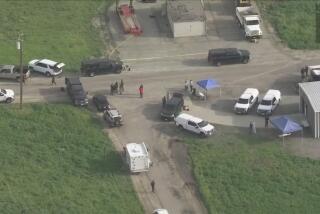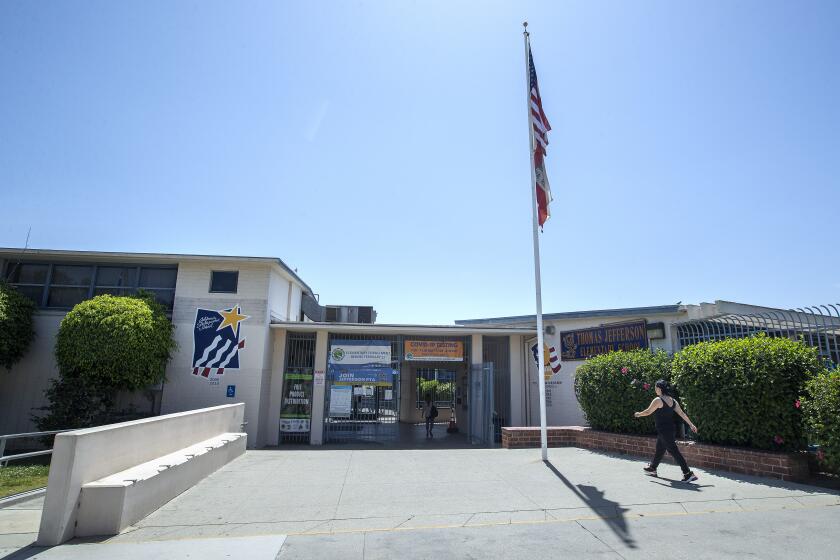Blast that killed 4 Marines probably caused by grenade, report says
CAMP PENDLETON — The explosion that killed four enlisted Marines during a Nov. 13 training exercise was probably caused when a grenade round was accidentally “dropped, kicked or bumped,” according to an investigation report released Thursday.
The grenade set off an explosion in a stockpile of several hundred grenades and several larger shells that had been gathered for disposal. An armed grenade, like those that were set for disposal, can detonate after falling as little as 4 inches.
As a result of the investigation, a captain and a master sergeant were relieved of command — an action that may end their careers.
Brig. Gen. John Bullard, commanding general of Marine Corps Installations West, said that the exact cause of the accident may never be known since the only people who would know for sure were the four who were killed.
The four Marines were explosive ordnance disposal specialists who had been assigned to clear away thousands of rounds from one of the impact areas on the base.
The lead investigator concluded that the captain and the master sergeant had done their jobs correctly and did not warrant punishment.
But Bullard disagreed, finding that he no longer had “trust and confidence in their ability to ensure proper preparation” for explosive ordnance training.
The captain and the master sergeant had failed to adequately assess the potential danger given the large number and type of ordnance, Bullard decided.
Ordnance specialists have a saying: “If you pick it up, you own it until you put it down,” Bullard said.
Though it is unknown whether the grenade was being handled hand to hand, Bullard said, the investigation showed that Marines were handing some grenades to one another during the collection process, a technique that is not prohibited but heavily discouraged.
“It’s not a hot potato,” he said.
The 4-inch grenade round is designed to be launched from a ground- or vehicle-mounted position.
The investigation, and a parallel one by safety specialists, will probably result in new rules for handling unexploded ordnance on training fields, Bullard said.
The incident is also expected to act as a “wake-up call” to Marines assigned to ordinance disposal, he added.
Explosives disposal has been one of the most crucial and dangerous missions in Iraq and Afghanistan, where buried bombs have been used as a “weapon of choice” against U.S. and coalition troops. Disposal technicians are widely lauded by frontline troops.
All four Marines had deployed to combat zones and been awarded a Combat Action Ribbon, awarded only to Marines who were under fire and returned fire.
Those killed were:
- Staff Sgt. Mathew Marsh, 28, of Long Beach. He deployed twice to Iraq and twice to Afghanistan.
- Gunnery Sgt. Gregory Mullins, 31, of Bayou L’Ourse, La. He deployed twice to Afghanistan.
- Sgt. Miguel Ortiz, 27, of Vista, Calif. He deployed to Iraq and Afghanistan.
- Staff Sgt. Eric Summers, 32, of Poplar Bluff, Mo. He deployed to Iraq and three times to Afghanistan.
Two other Marines and a Navy corpsman were injured in the accident and were treated and released after receiving medical assistance at the scene.
The Marines were part of a group assigned to clear away thousands of rounds of unexploded ordnance on the Zulu range on the sprawling base. Clearing away ordnance is a basic maintenance chore in preparation for using the range for training.
The families of the four were briefed on the findings of the investigation in the days before Thursday’s release. The report was released under the Freedom of Information Act.
Part of any investigation into a training death is an examination of whether safety precautions were followed.
In March 2013, seven enlisted Marines from Camp Lejeune, N.C., were killed during mortar training at the Hawthorne Army Depot in Nevada.
The premature explosion of the 60-millimeter mortar round that killed the seven was later determined to have been caused by human error in using a mortar, the Marine Corps said.
A lieutenant colonel, a captain and a chief warrant officer were relieved of command as a result of the investigation.
More to Read
Start your day right
Sign up for Essential California for news, features and recommendations from the L.A. Times and beyond in your inbox six days a week.
You may occasionally receive promotional content from the Los Angeles Times.






